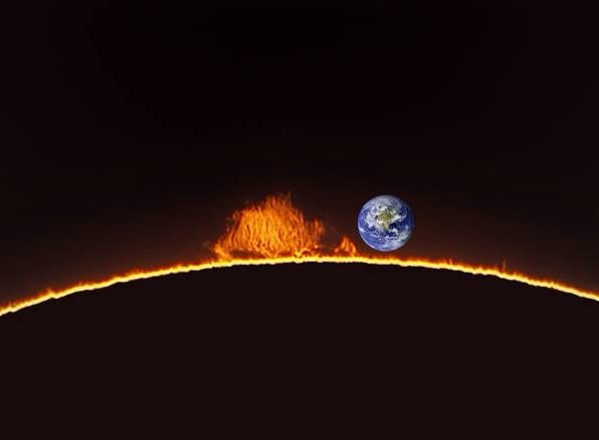This is the best prominence today.. big fire on the Sun.
Flying bird filament - 11 July 2013
Sure seems to me.. a flying bird filament.
AR 1785 - 11 July 2013
So this active region has crossed all the face of the sun and now is very close to the limb before it disappears from our view.. This is how it is looking today.
AR 1785 - 10 July 2013
So here is its picture again today. I have captured some quick videos of a prominence today and i will try to make an animation of of these AVIs. But, the method i use, it will take something like 4-5 hours to complete it.
Prominence - 9 July 2013
I imaged it yesterday.. this is how it has changed after about 24 hours.. seeing was getting worst so the sharpness is somewhat lost here.
AR 1785 - 9 July 2013
AR 1785 today.. the sky is all grey here and the seeing is also not very good. With my 8 bit camera it is very hard to not to overexpose the plage regions while keeping the surface bright enough to see the details. Hence i have 'burnt' some pixels here.. DMK21 is a good camera but i am looking for a better one these days.. something like LSI.
Big Filament 8 July 2013
Here is one of the larger filaments on Sun today.
Best prominence today 8 July 2013
This is the best prominence today on the Sun.. lovely fire here!
AR 1785 on 8 July 2013
This is how it has been changed in about 24 hours. I tried not to 'burn' bright pixels by keeping the exposure a bit down but i do like to make the 'Plage' a bit brighter, more on the bluish side.
Solar Disk with AR 1785
okay so here is the whole disk of the sun.. as usual, four mosaic with different processed flavor.
AR 1785, Active Sunspot Region
According to spaceweather.com, in less than 24 hours this sunspot region has stretched by more than 40,000 km. I cannot image sunspots these days but i can use h-alpha telescope to see the region.. here it is in color.. look how strong the bright plage features are, a sure sign of strong magnetic activity.
Following is the picture taken from Damien Peach yesterday. This image was taken with the visible light and 356mm telescope. Same area on the sun, but in two different lights.
Copernicus crater and splash effects
This is an old file, which i found yesterday in my old external hard drive. I think i used DBK31 color camera for this one. This file has more than 18,000 images and has a size of 45 GB!
Back then, i processed it with Registax only which i had put on my older website. I am not sure if i was able to put it back on this new one.
Last night i re-processed it with AVIstack (i love this program!) and registax and photoshop.. here is the result. Copernicus crater (the central white rings) happened when a huge piece of rock slammed the surface of the moon and made a big crater at the spot. It is more than 90 km in size and just look how far the splash effect went out around it.. beautiful.
No solar imaging today either
okay.. so this is the picture of the Sun.. but not the one i would ever enjoy to take. I waited for about 2 hours to see if the clouds move away but they did not. Not happy at all.
No Solar Imaging today
Hi everyone.. i have been imaging the Sun daily for a few days now but today thin clouds were ruining the sky and they held me back from reaching to the Sun and grounded me for today. Sorry, no solar proms from my telescope today :(
Tomorrow i should try to get as many as possible with my 'humble' 60 mm scope and DMK21 camera.
Full Solar Disk - 4 July 2013
When i upload the images of the prominence, i start to get the requests for the picture of the whole disk of the Sun. With 'Imaging Source DMK21 camera, i have a comparatively small CCD chip. This works well because i can get to 60 fps with totally uncompressed raw images. The trade-off is that i can image a very small portion of the sky.
To image the whole disk of the Sun, today i removed the 2.5X barlow (which obviously zooms the view 2.5 times) between the camera and the 60 mm telescope.. this still does not give me the whole disk of the sun. So to capture the whole disk, i must record 4 different AVI of each quadrant of the Sun.
I went upto 10,000 images in less than 3 minutes and used a 1,000 to stack and process with my usual routine. Photoshop was not behaving with its Automate-Photomerge feature so i had to stitch each image manually.. its really hard to manage the brightness/contrast this way.
Here are the final images.. Which is the best one for you?
Prominence - 4 July 2013
Not much for the prominence today.. Here is the best out there right now.
Disk view of 3 July 2013
Once again an inverted processing.. if you are in a good mood it may feel as 3D view of the Sun.
More from 3 July 2013
I tried a little different approach here. These are pseudo colors of course but i first inverted the B/W image and then colored it like this.. also made the sky black which was all white when i inverted the image.
More prominence from 3 July
This is beautiful folks! I processed it with more care than my earlier previous images.
Prominence 3 July 2013
These are a few prominence today on the Sun


